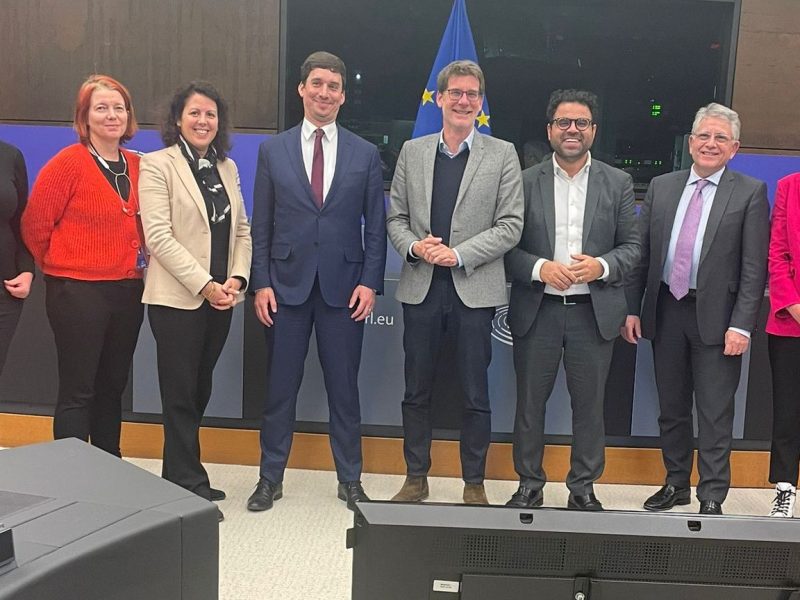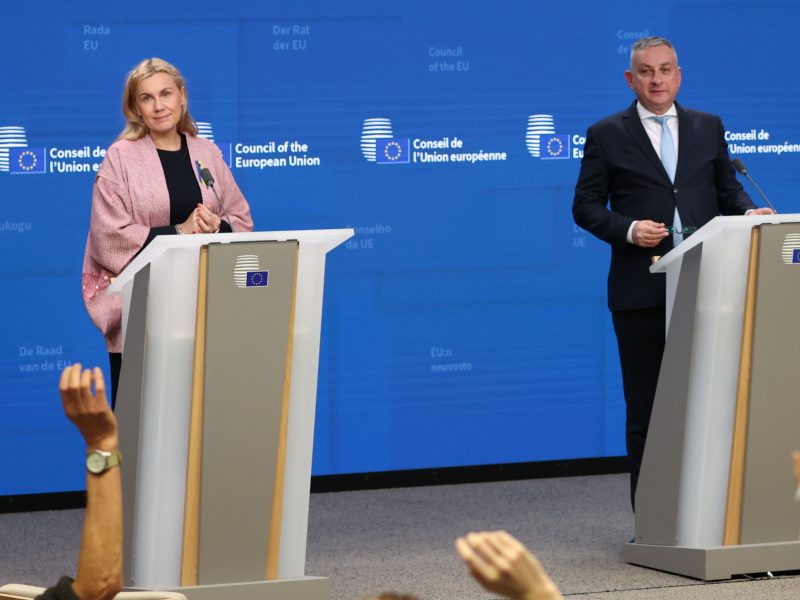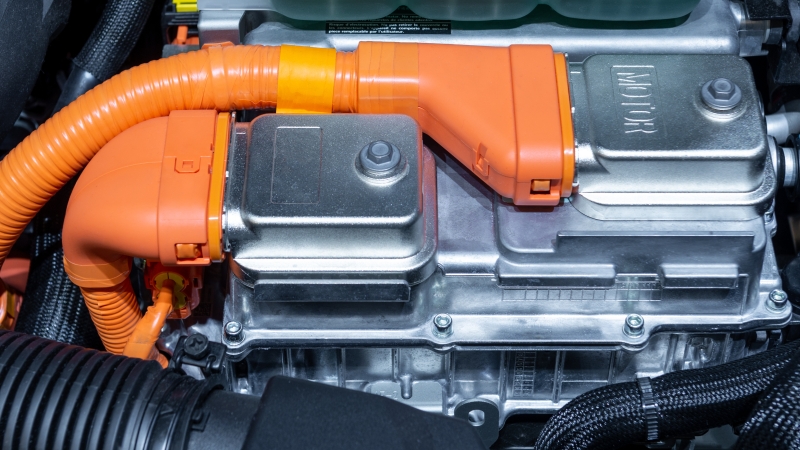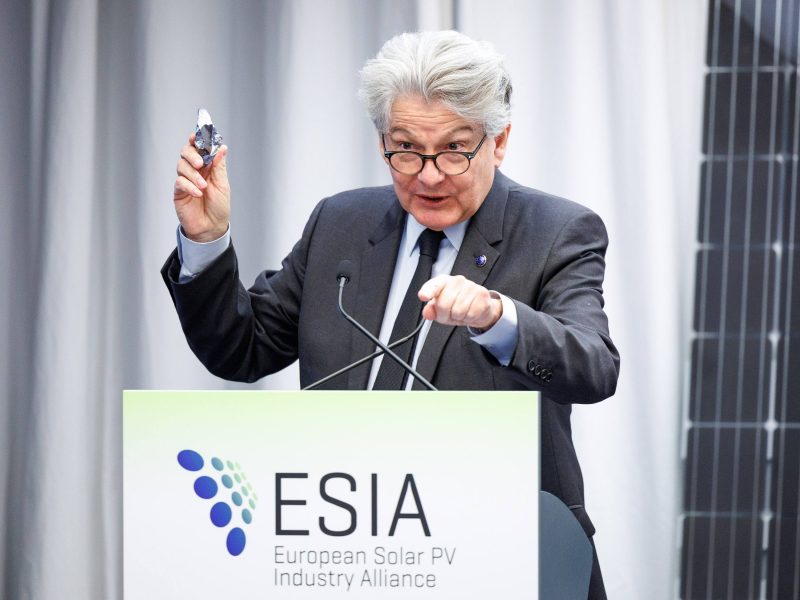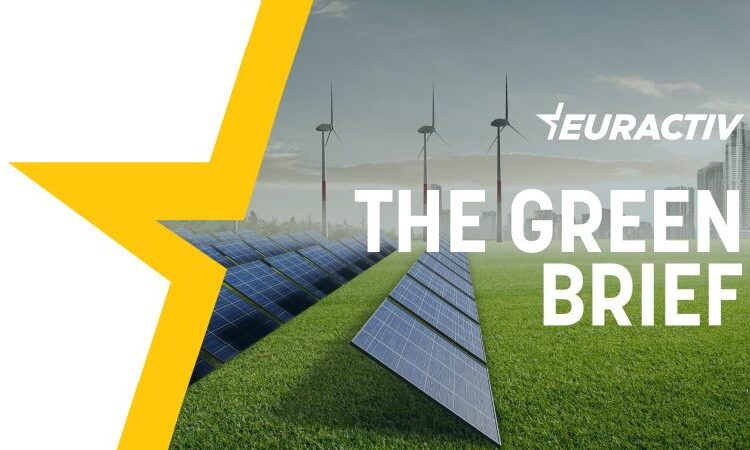
Welcome to EURACTIV’s Green Brief, our weekly selection of energy and environment news from across Europe. To subscribe, follow this link. You can also subscribe to our daily newsletter here and to our comprehensive weekly update here.
The European Parliament and EU member states are still at loggerheads ahead of decisive talks this weekend to reform the Emissions Trading Scheme (EU ETS), the biggest carbon market in the world and the cornerstone of the EU’s climate policy.
Their contrasting positions are plain to see in a document prepared by the Czech EU Presidency, obtained by EURACTIV, which outlines the remaining sticking points ahead of the talks.
The phase-out of free CO2 allowances to the industry is a flashpoint in the negotiation, which opens on Friday evening and might extend into the weekend.
In June, the European Parliament voted to phase out free allocations for industries like chemicals, cement and steelmaking, which currently receive most of their CO2 pollution permits for free. Under the Parliament’s mandate, half of the free allocations would be phased out by 2030 before they are terminated in 2032.
And for some in Parliament, the 50% figure for 2030 is non-negotiable.
“For us Greens and also for the Parliament more broadly, this is a red line,” said Michael Bloss, a German Green MEP who sits on the Parliament’s negotiating team.
“We cannot allow this pollution party to continue,” he told EURACTIV in an interview. “If they want to continue, then we are out.”
The ETS caps the emissions of about 10,000 factories and power plants, which have to submit an allowance for each tonne of CO2 they emit in the atmosphere. Those with surplus credits can make a profit by selling allowances on the market.
The scheme is now being tightened to align with the EU’s commitment to reduce emissions by 55% by 2030 before the bloc eventually reaches net zero in 2050.
But EU countries want a slower phase-out of free allowances. On 29 June, the Council of the EU voted to end those by the end of a ten-year period starting in 2026.
For the Greens, this is too late in the face of the climate emergency. “They have to move,” said Bloss, who points out that polluting industries have already earned €98 billion from the scheme since 2013.
According to the German MEP, free allocations should act as an incentive for industry to decarbonise, not as a fossil fuel subsidy. “We don’t want to take it away from industry; we just want to make it productive,” he argued, saying allowances should instead be auctioned to raise money for the innovation fund, an EU programme for the demonstration of innovative low-carbon technologies such as green steel.
ETS for buildings and road transport
The other big remaining issue is the proposal to introduce a separate carbon market for buildings and road transport (ETS BRT), which critics warn risks triggering Europe-wide protests similar to what happened in France with the ‘Yellow Vests’.
Because of the ongoing cost-of-living crisis, the European Parliament voted to apply the scheme only to businesses, while private households would be covered as of 2029 only, subject to a separate legislative proposal and cost-benefit analysis.
Poland too has insisted on keeping private households out of the system, warning of the social repercussions this could have.
But the Council is still pushing to introduce the scheme earlier, as of 2027.
For Bloss, this would be acceptable only if the corresponding social climate fund is significantly boosted to compensate for the extra cost imposed on families.
The general rule should be simple, he said: “The higher the CO2 price, the bigger the social climate fund,” with anything above €40 going directly to social compensation. “If the price of carbon is €50 per tonne, then the difference – €10 – goes to the social climate fund.”
EU countries, for their part, argue that a split scope between private and commercial operators would be “unworkable” and prefer sticking with the original idea of keeping both together under the same umbrella. Predictably, national capitals are also reluctant to put more money into the social climate fund.
Positions remain entrenched, with the Czech EU Council Presidency admitting that the ETS BRT and its interlinkage with the social climate fund “remains the single most problematic issue in the negotiations.”
Ideas have been floated to break the deadlock, such as the introduction of a “geopolitical conditionality”: if gas and oil prices are exceptionally high, the ETS BRT would be delayed by one year, according to a European Commission paper obtained by EURACTIV.
The stakes should not be underestimated. In the middle of an acute cost-of-living crisis caused by rising energy prices, the introduction of new environmental taxes on the most vulnerable risks triggering a backlash against the EU.
With the European elections due in the spring of 2024, EU politicians would be ill-advised to ignore the potential consequences.
Today’s edition is powered by NGVA
The Gas Vehicle Industry Launches a Carbon Neutral Roadmap to 2050
The organisation calls on EU policy makers to come up with a more balanced regulatory framework when it comes to carbon neutrality and the inclusion of renewable fuels.
STOCKHOLM. Planned wind farms in north Sweden risk big problems for industry. Large offshore wind farms planned to be built in the bay of Bothnia could pose a problem for shipping routes particularly during the harsh winter when icebreakers are needed to clear the way, according to the Swedish Maritime Administration. Read more.
DUBLIN. Dublin approves plan to tackle energy poverty. The government approved on Tuesday its plan to tackle energy poverty and to help the poorest households adequately heat their homes amid cold snaps and rising energy bills. Read more.
BERLIN. German police cracks down on climate activists. Police forces across Germany have searched the homes of climate activists linked to the “Last Generation” movement, which in turn accused prosecutors of attempting to intimidate protesters. Read more.
LJUBLJANA. Slovenia imposes windfall tax on energy companies. Energy companies in Slovenia will pay a special tax on windfall profits under legislation that will channel revenue towards promoting renewable energy sources and price subsidies following a law passed on Friday. Read more.
ROME. EU Commission approves first ‘energy corridor’ between Italy, Africa. A project to construct a new submarine power line that will transport clean energy from Tunisia to Italy was given the green light by the European Commission. Read more.
PARIS. Renewable energy delay is costing France billions: report. France is losing €6-9 billion a year in gas imports because the country fails to meet its renewable energy goals agreed upon at the European level, according to a new think-tank study unveiled on Thursday. Read more.
BRATISLAVA. Hungarians storm Slovak gas stations amid fuel crisis. Southern Slovak gas stations were flooded with Hungarians from border regions this week as Hungary deals with fuel shortages caused by the government’s price cap. Read more.
LONDON. Britain approves first new coal mine in decades despite climate targets. Britain approved its first new deep coal mine in decades on Wednesday to produce the high-polluting fuel for use in steelmaking, a decision which drew criticism from opponents who say it will hinder climate targets. Read more.
PARIS. French to get new cash transfers to quell high fuel prices. French citizens who drive to work will be eligible for a new 2023 direct transfer scheme amounting to €100, announced Prime Minister Elizabeth Borne, adding that it will only be granted to those earning under a specific salary. Read more.
CEOs call for faster decarbonisation in face of energy crisis. The CEO Alliance for Europe, a cross-sector group of 13 companies involved in the energy transition, has called for faster electrification and digitalisation in response to rising energy prices.
The joint appeal was issued after the group held its biannual meeting in Rome, at the invitation of Enel, the Italian electricity company.
“Europe’s dependence on fossil fuel imports is the root of the recent difficulties and a strategic vulnerability,” the CEOs write, pointing out that high energy prices account for “nearly half” of inflation currently seen across Europe.
“In this crisis, accelerating the energy transition is the only way forward,” they add, calling for “greater and faster fossil-free electrification, energy efficiency and digitalisation of all sectors” including industry, transport, buildings and construction.
When the CEO Alliance was founded in 2020, it was all about climate protection, the group writes. “Two years later, it is also about defending the future of ‘industrial Europe’,” they add. “And these two goals are closely linked.”
The alliance brings together the CEOs of ABB, AkzoNobel, E.ON, ENEL, Ericsson, H2 Green Steel, Iberdrola, SAP, Scania, Schneider Electric, Skanska, UniCredit, and Volkswagne. Read their joint statement here. (Frédéric Simon | EURACTIV.com).
////
Pollution in the EU still too high despite progress. EU policies under the 2021 zero pollution action plan have contributed to reducing pollution, but stronger action is needed to achieve the 2030 targets, according to two EU reports published on Thursday (8 December).
While pollution from pesticides, antimicrobials and marine litter is decreasing, not much progress has been made on pollution from noise, nutrients and waste, according to the EU’s Zero Pollution Monitoring and Outlook Report and Clean Air Outlook report.
A good result has been achieved in reducing the health impacts of air pollution, with a 45% fall in premature deaths since 2005. However, current pollution levels are still high, with over 10% of premature deaths in the EU each year related to environmental pollution, in particular, air and noise pollution and exposure to chemicals. Differences between EU member states are visible, with premature death levels around 5-6% in the North and 12-14% in the South and East of Europe.
Positive results are also visible in the decreased amount of plastic litter at sea and in the high rates of compliance with EU standards when it comes to drinking and bathing water (>99% and >93% respectively).
The implementation by the European Union of all relevant measures proposed by the Commission would bring the number of premature deaths due to air pollution down by over 70% in 2030 compared to 2005, the analysis suggests. Findings will be discussed at the upcoming zero pollution stakeholder conference on Wednesday (14 December). (Valentina Romano | EURACTIV.com).
////
EU member states agree stance on green crime law. Justice Ministers from the EU’s 27 member states adopted on Friday (9 December) their position on a directive to protect the environment through criminal law, also known as the Environmental Crime Directive (ECD).
The scope of the directive has been broadened to include 20 offences, instead of the nine currently listed under EU criminal law, including timber trafficking and breaches of legislation on chemicals.
The proposal also provides a clearer definition of what constitutes environmental crime, aims to improve prosecution of offenders, and harmonises the level of penalties.
However, the original Commission proposal has been watered down by Member States, according to environmental groups, who say ministers have weakened the sanctions applicable. They also highlight that several major offences are still not covered by the directive – for instance on illegal and unregulated fishing or underwater noise pollution.
“We are concerned about the low levels of ambition for the harmonisation of sanctions for companies,” said Patrizia Heidegger, deputy secretary general at the European Environmental Bureau. “Europe needs true criminal fines set at minimum levels of maximum sanctions of 15% of annual turnover for companies. Europe cannot afford another failed criminal law response like the one we have seen with the Dieselgate scandal,” she added. (Valentina Romano | EURACTIV.com).
DECEMBER
- 7-19 DECEMBER. UN Biodiversity Conference (COP15). Montreal, Canada.
- 15 DECEMBER. European Council.
- 16-17 DECEMBER. Trilogue negotiations: Emissions Trading System (ETS) and Social Climate Fund.
- 19 DECEMBER. Energy Council.
- 20 DECEMBER. Environment Council.
2023
- 1 JANUARY. Sweden takes over EU Council Presidency.
- Q1 2023. European Commission to present proposal to reform EU electricity market.
- 16 MARCH. Environment Council.
- 23-24 MARCH. European Council.
- Q3 2023. European Commission to present proposal for hydrogen bank.
- Q3 2023. European Commission to present proposal on greening corporate fleets.
- 19 JUNE. Energy Council.
- 20 JUNE. Environment Council.
- 29-30 JUNE. European Council.
- 26-27 OCTOBER. European Council.
[Edited by Zoran Radosavljevic, Alice Taylor and Frédéric Simon]

